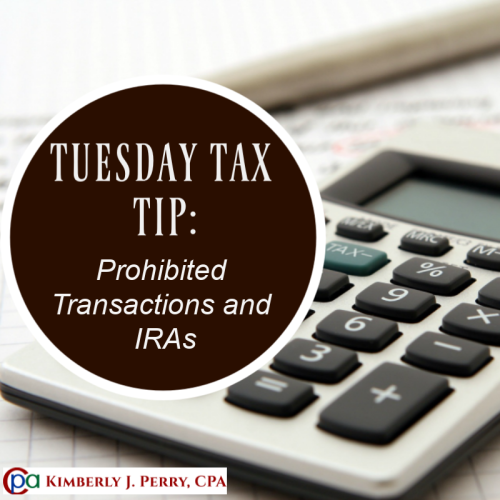Tuesday Tax Tip – Prohibited Transactions and IRAs – 1/15/19
 A prohibited transaction is an impermissible transaction under the Internal Revenue Code that occurs between an IRA and a disqualified person.
A prohibited transaction is an impermissible transaction under the Internal Revenue Code that occurs between an IRA and a disqualified person.
Disqualified persons include the IRA owner, the owner’s spouse, the owner’s lineal descendants (and their spouses), IRA beneficiaries and any IRA fiduciary.
If you engage in a prohibited transaction, under IRS rules, your entire IRA will lose its status as an IRA. Your tax-deferred IRA will then be treated as though the assets were distributed to you as of the first day of the year the prohibited transaction occurred. Ordinary income tax will be due on the distributed amount and if you are under age 59½ you will also be subject to a 10% early distribution penalty.
Below are just a few common examples of traditional IRA prohibited transactions:
• The sale, exchange or leasing of property involving your IRA
• Borrowing money from or lending money to your IRA
• Receiving personal benefits or payments from your IRA
• Using your IRA as collateral for a loan
• A transfer of your IRA plan income or assets to, or use of the assets by or for the benefit of,
a disqualified person
Strategy Tip: If you are unsure whether the transaction you wish to participate in with your IRA is
prohibited (a lot of self-directed IRA owners have faced this problem) you may want to consider
splitting your IRA prior to the transaction. You will essentially carve out the amount you want to
use from your original IRA, creating a separate IRA specifically for the questionable transaction.
This way, if it turns out that the transaction you wish to engage in is in fact a prohibited
transaction, it will only impact this second IRA and you avoid destroying your entire original IRA.
Source: www.irs.gov